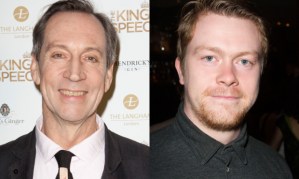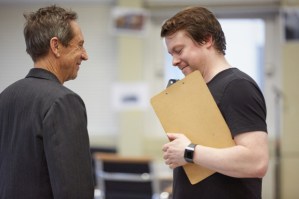Review: Frost/Nixon (Sheffield Crucible)
Kate Hewitt directs the regional premiere of Peter Morgan’s play
You might call Peter Morgan‘s play How To Catch a President. No prizes for guessing why director Kate Hewitt has revived this forensic examination of David Frost’s infamous interview with the disgraced Richard Nixon for the first time since its 2006 premiere. The question of Donald J Trump’s treason hangs in the air, but Morgan makes clear that powerful men never go down without a good fight.
Morgan’s actual title positions the televised encounter as a big-name, big-money boxing bout. He shows us the hype, as Frost strains to secure financial backing (£600,000 of which – £3 million today – went straight to Nixon himself), as well as the training of two opposing teams. Nixon’s coached by his military chief of staff, Jim Brennan, and Frost’s squad of hard-nosed hacks strategise to skewer him on Vietnam and Watergate. If Frost comes out on top, Morgan argues its because he gets his medium. While the president plays for points, evading and rambling, the talk show host knows he needs one knockout blow. Television’s reductive – and today’s memes are much more so.
Today, it looks positively prophetic – not least in its own understanding of media. The suggestion that serious journalism is outflanked by puff personality pieces sits alongside an uncomfortable, unspoken collusion between ratings-conscious producers and ratings-conscious politicians; two establishments entwined. Nixon’s parting shot – that perhaps the affable, telegenic Frost should have been the politician – leaves a sting given the television host sat in the Oval Office.
More so than Michael Sheen and Frank Langella, who recreated their stage roles on the big screen, Daniel Rigby and Jonathan Hyde pin down impersonations. Rigby nails the nasal twang of Frost’s voice, even the way he revs up his words, but suggests both a steely core and a serious drive beneath the toothsome smile. Hyde’s Nixon – mouth downturned, shoulders stooped, jowls a-go-go – occasionally morphs into the man himself with his widow-peaked profile. If he shows us a slippery, inscrutable customer, privately weighed down by the heaviness of history, the effect is still first and foremost uncanny.
That’s what makes Hewitt’s revival so gripping – the sense that it is, at some level, a re-enactment. With big stadium-style screens showing close-ups overhead, the production seems acutely aware of its accuracy. Andrzej Goulding’s videos swerve smartly between swish, filmic scenes and unvarnished live feeds to flag artifice and its opposite, revealing Morgan’s elision of fact and fiction. Indeed 12 years on, in its forensic raking over of mediatised material, Morgan’s play seems a forerunner to contemporary forms: not just a dramatised documentary, but a precursor to factual entertainments like Serial or the Watergate podcast Slow Burn. Like them, Frost/Nixon reshapes and reanimates historical events for every last drop of suspense, and Hewitt delivers. George Dennis’ superb soundscape – screeching '70s guitars and the echo of landed blows – only ratchets it up.
Ben Stones’ television studio set, which recreates the Stars and Stripes in studio lights, suggests the American dream is the bright glare of fame. Carving out a shadowy substage, he implies that Nixon can’t stand the loss of his limelight. Though Morgan overstretches the connections between interviewer and interviewee – drawing a parallel between two bullied boys with chips on their shoulders – he nonetheless ties their fortunes together. Nixon needs his exoneration as much as Frost needs to elicit it. Both benefit from a confession and, in a sozzled, small hours phone call, Nixon goads his investigator into going for him. As Frost realises, "He wants me to finish him off." Remind you of anyone?
Frost/Nixon runs at the Sheffield Crucible until 17 March.
Read our interview with Jonathan Hyde – 'Nixon was nothing in comparison with what we have now'
















